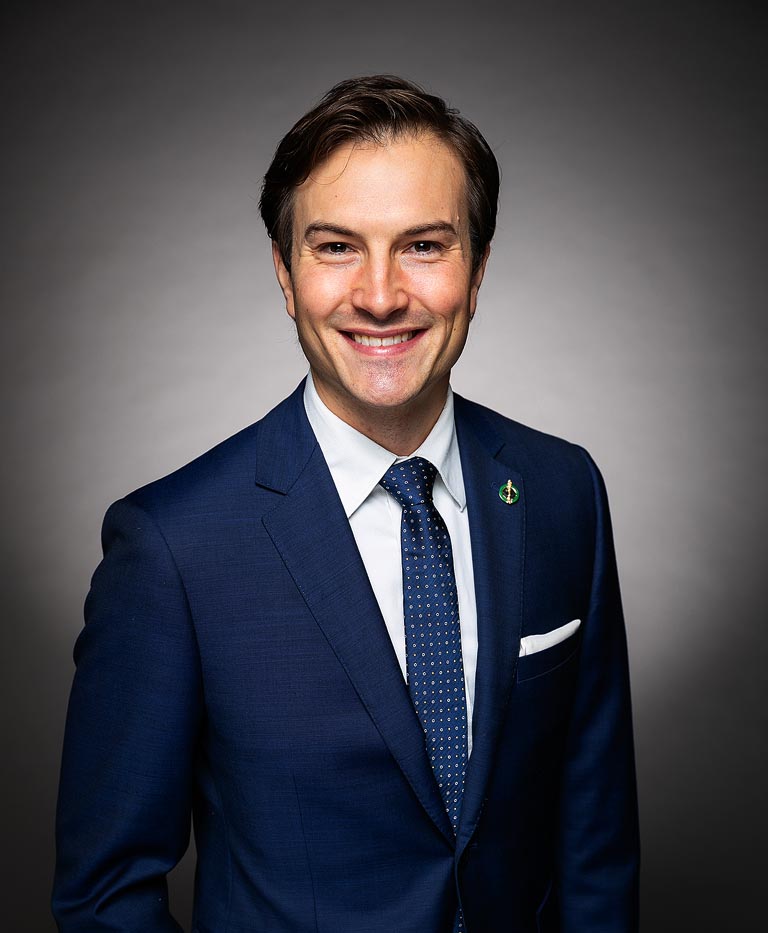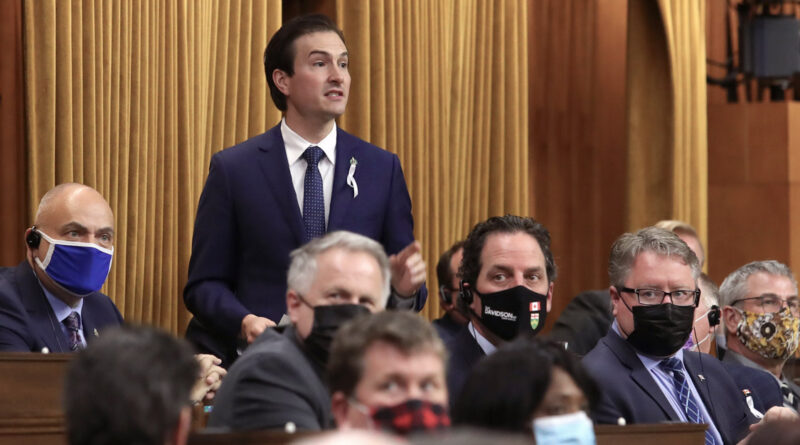Analysis: Chambers Rises To Speak
By John Swartz
Since the occupation of Ottawa began, there have been many things said and done by politicians about the affair, some pretty dumb things and some pretty offensive to Canadiana sensibilities.
However, if one were to be watching to CPAC (Cable Public Affairs Channel) Saturday morning, February 19, especially after listening to ongoing debate of the Emergency Act which began on February 17, your attention might have been riveted when Simcoe North MP, Adam Chambers rose to speak.
Not just because he is our MP, but because his voice stood out from all the rest – he was making sense. He didn’t harang the government over misinterpreted points of the Act, or accuse the prime minister of all manner of despotism in order to score public opinion points. In fact, you might have thought for a moment you were in a time warp, watching a member of the loyal opposition question the government on policy, or procedure, or mechanics if implementation, or how to pay for a particular item – you know, doing the things any opposition party member is supposed to be doing instead of grandstanding to make a clickbait headline.
One could have thought in anticipation, based on the discourse preceding (and following), ‘oh god, what is he going to say?’ Rather than embarrass the people of Simcoe North, he instead gave us reason to be more comfortable Chambers is our representative.
He affirmed the right to protest (“Everyone has the right to peacefully protest any government policies”) while condemning elements of what happened during most of February (“We cannot allow prolonged blockades or barriers that paralyze trade corridors, pipelines, railways, supply routes, ports or urban cores at any time”) and took a dignified swipe at the response to the occupation (“We are not at liberty to decide which laws should apply in some situations but not others”).
He took aim at the behavior of some of the protesters (“People who join protests to encourage violence or the overthrow of government undermine democracy”) but questioned invoking the Emergency Act as the solution to the problem:
“Somewhere along the way, we entered a state of lawlessness, but the answer to lawlessness cannot be more lawlessness. The government is asking us to suspend certain laws to deal with those breaking others. We are being asked to undermine democratic principles to address some who wish to see democracy itself undermined.”
That is a very different tone and selection of words than other MPs used. SUNonline/Orillia spoke with Chambers by phone last week to better understand a few points made during the speech and to expand on others.
First, is find out why Chambers didn’t follow his caucus members in the manner of accusation and attack on the judgment of the prime minister.

“It’s been a tough two years on a lot of people. It became a flash point for a lot of frustrations. Actions that individual protesters take should be condemned and/or held responsible for it. If all of us had been reduced to those moments where you say, ‘upon reflection, maybe I would have done it a different way,’ we’re all human and it became emotional or a lot of folks on all sides of this; this whole discussion on mandates and vaccines, and whether we open, whether we should close, and whether the truckers were right or not, it all became very emotional. I try to keep emotion in check, objectively looking at, where do we go from here?” Chambers said.
The central theme of his speech was about invoking the Act as the proper thing to do and if so, where’s the evidence?
“There’s a strict, kind of legal threshold the government is supposed to demonstrate it has met. I acknowledged it in my speech, I am prepared to be proven wrong on that point, it was not made clear to me as a member of the House, the government was forthcoming on the information that would lead one to conclude the threshold had been met,” Chambers said.
“Even if it is seen to have been met, the two challenges I have are one, it’s not clear to me all other avenues were exhausted prior to invoking. Additionally, it also not clear to me the actions that were taken with respect to moving and removing the protesters could not have been done through other means, or other acts. The provincial government has the ability to request help from other levels of government without invoking the federal Emergencies Act. It (the province) has its own ability to do stuff, in fact the provincial government had frozen accounts prior to the invocation of the emergencies act; and then finally, the vote was held Monday night, the streets of Ottawa were clear on Sunday. It was not made clear to me as a voting member, the government wasn’t being very forthcoming with information on why the Act needed to be in place.”
Chambers also questioned the procedure for invoking the Act and involving parliament. From his speech: “It is difficult to determine whether the government is justified without adequate information. There were no briefings. No secret intelligence has been shared. Whether it is incompetence or malfeasance is truly regrettable.”
“I’m not saying there absolutely no basis whatsoever, but the government has not been very clear with why it needs to remain in effect. When you are invoking a law like this that gives the government significant powers, I was disappointed the government wanted to brief the media and leak information to the media before making presentations to the House,” Chambers said.
“When you are in a kind of crisis and you are asking parliament for extraordinary powers, you ought to be speaking to them (members of the House) and making the case. The prime minister did not speak to the House of Commons for three days.”
“If this was such the emergency and you wanted to take the politics out of the situation, the prime minister would have picked up the phone; he would have called the leader of the opposition and would have said, “look, I need to brief you. This is going to be top secret. You can’t talk to anybody about this, but I’m going to show you what we have.” That didn’t happen. Maybe I’m a little too naïve, but I would expected for a situation that called for the invocation of the Act we would have been meet with a little more transparency,”
“I’m a new member, I don’t’ expect somebody to pull me aside and give me all the state secrets, but I do think there was opportunities and avenues available for the government to provide to the House of Commons, whether it’s through a committee, or a smaller group of people what was really going on.”
One stands in awe of the rhetoric from many opponents of invoking the Act, the wild suggestions our Canadian way of life will forever be altered, that the prime minister, not the government, is seizing power for personal gain, that citizens will have their rights abused. The leaps of logic are astounding if one has read the Act, because the special authority of the Act, which was democratically passed, and democratically invoked, is quite clear on its limits. In fact it begins with:
“the Governor in Council, in taking such special temporary measures, would be subject to the Canadian Charter of Rights and Freedoms and the Canadian Bill of Rights and must have regard to the International Covenant on Civil and Political Rights, particularly with respect to those fundamental rights that are not to be limited or abridged even in a national emergency;”
None of the things the government, and the prime minister in particular were accused of are remotely possible.
“That’s a fair interpretation of the act. It is not the same as the predecessor, the War Measures Act, in the same kind of way, so there’s probably a perception there it is identical. There are more checks and balances in the Emergency Act than there was in the War Measures Act, there’s no question about it. At the same time, it had not been used before and you kind of ask yourself, ‘is this the moment?’” Chambers said.
“Maybe the government had met it, but is this the moment that called for it? Was there other things we could do?”
Many Canadians do not understand the division of power and authority between levels of government, and do not understand politicians making up the government cannot direct the police to do anything when it comes to enforcing law. Doug Ford got his fingers rapped for appearing to direct the OPP early in his term. The Ottawa council could not get the Ottawa Police Service to act as they wished – even the council could agree on what those actions should be. And, the prime minister or cabinet can’t tell the RCMP specifically what to do.
There is also a chain of command. The OPP cannot waltz into any city with it’s own police department and start running things – without the government enacting legislation – which the Ontario government did with the Windsor border blockade, and the RCMP can’t encroach on provincial jurisdiction either, unless legislation allows – which the Emergency Act did do.
Notable is the Ontario declaration allowed the province to call in the RCMP, who were present in Windsor, and owing to their presence there and in Ottawa, it may have been the factor that prevented events turning into a police riot as happens so often with demonstrations (which does not explain the conduct of the RMCP at the Alberta border blockade, or demonstrations in Western Canada).
“You might be right on that, which I think proves another point, which is, was the act necessary to invoke to get everybody (levels of policing) to coordinate in Ottawa when it looks like there’s precedent a few days prior when people where collaborating?” Chambers said. He also acknowledged how police act in similar circumstance, but with different groups. “In a rule of law country, we should expect the law is applied in an even fashion in pretty much every circumstance.”
The other thing, which seems apparent in hindsight, is the government needed the emergency regulatory power to deal with the influx of foreign money to the occupiers, which sustained their ability to continue the protest. Financial law and regulation hasn’t kept up with the pace of technology and the FINTRAC system of monitoring movement of money did not include crowd funding financial entities. It’s possible some on the government side were concerned cutting the flow of money would take too long – owing to how long it normally takes to get a bill passed, when action was needed immediately.
“I recognize there are gaps in our current laws and regulations on money laundering and freezing bank accounts and looking at these kinds of funding issues. At the same time, the question still has to be asked, are we using extraordinary powers for something that should be ordinary powers, but we haven’t got around to doing yet? And the second question is, could they have done what they wanted to do in terms of freezing accounts, or making it more difficult to fund without having to invoke the act? On that question, it is possible the government didn’t have other options, but the burden of proof is on the government to provide and show and demonstrate it actually could not have done so.” Chambers said. He thinks there may have been other means to cut of the money.
“The Ontario attorney general, Doug Downey, froze the accounts. He was able to go to court and freeze an account. Courts will hear injunctions very quickly, especially in matters of serious importance that affect broader society. Just because it might have been difficult to do so, doesn’t mean it was necessary to use that (the Act). I will concede invoking the Act made it easier for the government to deal with it. The question isn’t whether it made the government’s job easier, or law enforcement’s job easier, but whether it was necessary.”
Also in hindsight, it appears the financial strategy was to starve out the protesters, as witnessed by the great numbers of them who left the protest during the week because there was no money to reimburse them for food and fuel, leaving a substantially reduced number of protesters to clear out once police moved in.
Chambers was concerned with the ability to freeze bank accounts, the lack of process and rules for doing so. In his speech he said:
“This will not just be a 30-day impact. It could affect their ability to receive financial services for 30 years or more. Individuals whose relationship with the state has already been strained, if not completely severed, will be further ostracized from broader society.”
SUNonline/Orillia asked for clarification on what Chambers meant by 30 years of effect.
“There’s a bit of a due process there I think is lacking. I know there’s a need for speed, but at the same time you hear all this discussion about the Emergency Act needing to comply with the Charter. Well, unreasonable search and seizure is a Charter right. They’ve done 206 accounts, or something. When we were talking about this, there was all these wild accusations about are they going after thousands of accounts, or hundreds of accounts, or tens of accounts, are they only going after the so-called organizers? The government was not very clear. They could have come and said here’s the criteria we’re planning to use, here is what we expect in terms of the application, here’s how many people we are talking about and here’s the process if we get it wrong. This is why I don’t support the death penalty; the state often gets things wrong,” Chambers said.
“Let’s say you unfreeze an account. OK, so now you’re account has been unfrozen whether it was a mistake, or you were a part of it but you decided you left. Are you now marked forever and is the bank able to say we really don’t want your business anymore and all of a sudden you are on a list, and you are not able to get banked? I’m more concerned on the consequences of this. We need to get the process right. This is the first time we are doing this. Every future discussion about the Emergency Act will come back to February 2022.”
“I would feel a lot more comfortable knowing a judge oversaw when someone’s account is being frozen, which is kind of the regular course. What’s happening right now is the RCMP is providing information to a bank and the bank is deciding whether they will approve the account or not. Banks are typically risk adverse, so they will always err on the side of caution and the act provides there is no liability the banks have in respect of any actions they take, so you couldn’t sue them for making a wrong determination. There’s not really a natural check and a balance in the system.”
“I’m a conservative and I am open to discussion where we outsource government functions to the private sector, but in this case we outsourced the judge and the jury and the implementer of the punishment to a private, publicly traded corporation that have different interests than the government.”
Chambers took aim at the perception the Emergency Act would upend existing law and in some way lead to autocratic rule.
“…the answer to lawlessness cannot be more lawlessness. The government is asking us to suspend certain laws to deal with those breaking others. We are being asked to undermine democratic principles to address some who wish to see democracy itself undermined.”
As noted above, the Emergency Act is a democratically enacted tool for use in unusual times and does not grant dictatorial power.
“It is a fair position to take that the act is legal and using the act is compliant, just as some people would say using the Notwithstanding Clause is part of the Charter, even though a lot of people would say you should never use it. My point was more, and it was reinforced yesterday at finance committee, the act says it’s subservient to the charter, but the government has conceded they are not complying with certain sections of the charter, including section 8, which is the unreasonable search and seizure.” Chambers said.
“The charter also says these rights can be limited in a proportional way, but with the consequences that are unknown when the debate was happening, it seemed to me the line (in the speech) that was most accurate, and there’s probably semantics around the rest of it, it is undermining democratic principles, like some charter freedoms, to deal with a situation where people are actually… we need more powers, we need to actually override some laws right now because there are people on the street who are breaking the law. In my mind it struck me as an interesting parallel to each other to draw on for the speech.”
“It wasn’t meant to be the main thrust of the speech. It was more an observation. It just struck me as an interesting dynamic.”
Another point of clarification from the speech was Chambers apparent assertion a large number of Canadians disagreed with the government’s conduct with the pandemic (which was the supposed reason for the occupation). He said in his speech:
“It is not leadership when a prime minister discounts and dismisses the views of millions of Canadians with whom he disagrees.”
At the moment of hearing the words, it was taken Chambers was talking about the protesters on hand, and SUNonline wondered where the figure came from when the best guess for the number of those on hand in Ottawa was approximately 10,000 at its peak, and maybe close to 100,000 supporters who didn’t show up.
I did not indicate how many people were part of the protest. I actually don’t know, your number is probably right. My point about the millions of people was a separate line of reasoning on the prime minister who, I would submit, has taken a very deliberate and unhelpful approach of hiving off and not really paying much, if any, attention to those people who disagree with him on a couple of these issues. There are three plus million Canadians who are unvaccinated for whatever reason. There even some that got vaccinated over the last three or four months. Some had done so not because they wanted to, but because there was fear of losing a job, etc. I’m pro vax, triple vaxxed, I think people should be vaccinated. My point in the speech is I prefer persuasion over coercion.”
It’s also the manner in which the prime minister and members of the government handled opposing viewpoints Chambers takes issue with.
“The prime minister seems to take any kind of opposition to any of his rules on vaccines or mandates; travel restriction are a good example, the travel restrictions actually made zero sense. Yet, any time you would question or critique the travel restrictions you were dismissed. There was this kind of condescension and dismissed as having views that were not mainstream. I’m not really sure that’s the kind of leadership you need in times like this,” Chambers said.
He cited examples of criticism waged at regulations, which frankly, many Canadians took issue with. The rule for PCR testing no more than 72 hours prior to re-entering Canada does not take into account someone in the Niagara area can get a test in Canada, go shopping for a day in Buffalo, and return using the result for a test they took before leaving the country. Another was about mandatory closings, toy stores had to close, but Chambers claimed Whole Foods could start selling toys and stay open. In short, closings were widespread, but with enough loopholes to be exploited, combined with uneven, or no enforcement.
Beyond The Speech
On the central issue, the occupation, driving the Emergency Act debate in which Chambers spoke, Chambers has questions about everyone’s role, including himself.
“Hindsight is always 20/20, but at some point we lost the ability to enforce laws generally, certainly at the borders for sure. The border stuff, you’re not a sovereign country unless you can control your own borders. Internationally it’s an embarrassment. That should never have been allowed to take hold as it did.” He said.
“The Ottawa situation, in a similar way, people show up to Ottawa to protest all the time. There’s not transport trucks that take up a lot of space. There’s a lot of different reasons why this one looked a little different and maybe ended up a little differently. At one point there was discussions, I believe, and I’m sure this will all come out, some of these details have come out, the protesters were actually ceded three lanes of traffic along Wellington and then, I think they were supposed to just keep moving, but they kind of stopped and decided to not leave. At that time when they decided not to leave, after being asked to leave, and that went on for a couple days, I think it became pretty clear there was going to be a bit of an issue here and this was taking a turn from your normal protest, disobedience, into something more.”
“I wasn’t there every day, but I was there for about 16 out of the 22 days, there was a lot of people that had no idea who was leading that thing; and there was a lot of people there who were there for reasons other than to talk about vaccine mandates of freedoms; they were there to create anarchy and violence.”
“At some point, enough time goes by and/or enough kind of requests are made to say, ‘we’ve got to reclaim public property here.’ You get to a point where you’ve been asked. I think it would have been incumbent on all individuals involved; municipal leaders, whoever has influence, police and others, to say ,’look here’s some new rules of engagement; you’re going to move the truck and if you’d still like to protest, you can and you are free to do it, you can park your trucks outside of the city and you can come in and you can protest like many other organizations on foot on the hills of parliament where people have protested for generations.’”
Regarding his actions and that of colleagues, and much has been said of some members approving and standing with protesters. The optics were not good and many Canadians are blaming the party for the actions of some members, or more specifically for not running the other way from those actions.
“We have caucus meetings that are very lively and are incredibly transparent and open with each other, like any family ought to be. I’ll leave the interpretation of some of those things to the party leadership and those individuals who are in positions of leadership in the party to have discussions about.”
“As I said in my speech, I think each member of parliament from all parties should have some level of self reflection and say,’ how was I involved in this whole situation.’ I even go broader than that, which is, how can I reflect on myself as a member of parliament over the first four months I’ve been there and are there some lessons I can take going forward? Would I do certain things differently? Would I be quicker to condemn various symbols of hate? Did I do that quick enough? Did I listen to people enough? I made the point in my speech, are we listening to our neighbours enough? I’m somewhat worried we create the culture of there’s a picture of you with this individual, so now everything that individual stands for is now directly attributable to you.”
“Actions of one or two, or a handful of members don’t represent all 338 (members of the House). We all have our own priorities, our own issues, our own values.”
This wasn’t Chambers first occasion to address the House, but the gravity of it was new.
“I can tell you it is still an experience, I still need to get a little bit comfortable in that space, It is a bit overwhelming to be in that space.”
“It felt good. I believe what I was saying. I wasn’t forced to say anything. The only regret I have is not mentioning being thankful for law enforcement people because we’ve got a lot of law enforcement folks in Simcoe North.
“I was floored to get some of the comments I got. The Bloc Quebecois member (Sebastien Lemire, Abitibi-Temiscamingue) basically said this might be the most constructive speech we hear on this matter.” Peter Julian, (NDP New Westminster- Burnaby) also spoke glowingly about Chambers’s speech, comparing it to Bruce Stanton’s often eloquent speeches to the House.
The bottom line is Simcoe North constituents have reason to feel better about our representation if this is the example of how our MP comports himself in heated times.
(Photos Supplied) Main: Adam Chambers speaking in the House of Commons.




